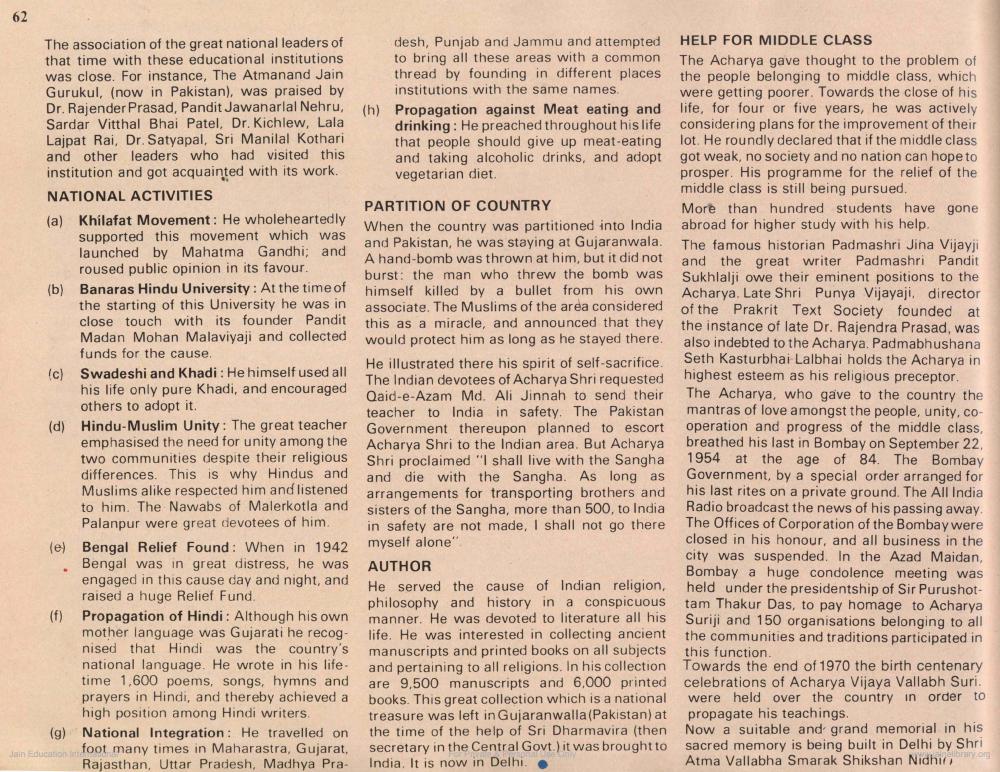________________
62
The association of the great national leaders of that time with these educational institutions was close. For instance, The Atmanand Jain Gurukul, (now in Pakistan), was praised by Dr. Rajender Prasad, Pandit Jawanarlal Nehru, Sardar Vitthal Bhai Patel, Dr. Kichlew, Lala Lajpat Rai, Dr. Satyapal, Sri Manilal Kothari and other leaders who had visited this institution and got acquainted with its work. NATIONAL ACTIVITIES
(a) Khilafat Movement: He wholeheartedly supported this movement which was launched by Mahatma Gandhi; and roused public opinion in its favour. (b) Banaras Hindu University: At the time of the starting of this University he was in close touch with its founder Pandit Madan Mohan Malaviyaji and collected
funds for the cause.
(c) Swadeshi and Khadi: He himself used all his life only pure Khadi, and encouraged others to adopt it.
(d) Hindu-Muslim Unity: The great teacher emphasised the need for unity among the two communities despite their religious differences. This is why Hindus and Muslims alike respected him and listened to him. The Nawabs of Malerkotla and Palanpur were great devotees of him.
(e) Bengal Relief Found: When in 1942 Bengal was in great distress, he was engaged in this cause day and night, and raised a huge Relief Fund.
.
(f) Propagation of Hindi: Although his own mother language was Gujarati he recognised that Hindi was the country's national language. He wrote in his lifetime 1,600 poems, songs, hymns and prayers in Hindi, and thereby achieved a high position among Hindi writers.
(g) National Integration: He travelled on foot many times in Maharastra, Gujarat, Jain Education t Rajasthan, Uttar Pradesh, Madhya Pra
(h)
desh, Punjab and Jammu and attempted to bring all these areas with a common thread by founding in different places institutions with the same names.
Propagation against Meat eating and drinking: He preached throughout his life that people should give up meat-eating and taking alcoholic drinks, and adopt vegetarian diet.
PARTITION OF COUNTRY
When the country was partitioned into India and Pakistan, he was staying at Gujaranwala. A hand-bomb was thrown at him, but it did not burst: the man who threw the bomb was himself killed by a bullet from his own associate. The Muslims of the area considered this as a miracle, and announced that they would protect him as long as he stayed there.
He illustrated there his spirit of self-sacrifice. The Indian devotees of Acharya Shri requested Qaid-e-Azam Md. Ali Jinnah to send their teacher to India in safety. The Pakistan Government thereupon planned to escort Acharya Shri to the Indian area. But Acharya Shri proclaimed "I shall live with the Sangha and die with the Sangha. As long as arrangements for transporting brothers and sisters of the Sangha, more than 500, to India in safety are not made, I shall not go there myself alone".
AUTHOR
He served the cause of Indian religion, philosophy and history in a conspicuous manner. He was devoted to literature all his life. He was interested in collecting ancient manuscripts and printed books on all subjects and pertaining to all religions. In his collection are 9,500 manuscripts and 6,000 printed books. This great collection which is a national treasure was left in Gujaranwalla (Pakistan) at the time of the help of Sri Dharmavira (then. secretary in the Central Govt.) it was brought to India. It is now in Delhi.
HELP FOR MIDDLE CLASS
The Acharya gave thought to the problem of the people belonging to middle class, which were getting poorer. Towards the close of his life, for four or five years, he was actively considering plans for the improvement of their lot. He roundly declared that if the middle class got weak, no society and no nation can hope to prosper. His programme for the relief of the middle class is still being pursued.
More than hundred students have gone abroad for higher study with his help. The famous historian Padmashri Jina Vijayji and the great writer Padmashri Pandit Sukhlalji owe their eminent positions to the Acharya, Late Shri Punya Vijayaji, director of the Prakrit Text Society founded at the instance of late Dr. Rajendra Prasad, was also indebted to the Acharya. Padmabhushana Seth Kasturbhai Lalbhai holds the Acharya in highest esteem as his religious preceptor. The Acharya, who gave to the country the mantras of love amongst the people, unity, cooperation and progress of the middle class, breathed his last in Bombay on September 22, 1954 at the age of 84. The Bombay Government, by a special order arranged for his last rites on a private ground. The All India Radio broadcast the news of his passing away. The Offices of Corporation of the Bombay were I closed in his honour, and all business in the city was suspended. In the Azad Maidan, Bombay a huge condolence meeting was held under the presidentship of Sir Purushottam Thakur Das, to pay homage to Acharya Suriji and 150 organisations belonging to all the communities and traditions participated in this function. Towards the end of 1970 the birth centenary celebrations of Acharya Vijaya Vallabh Suri. were held over the country in order to propagate his teachings.
Now a suitable and grand memorial in his sacred memory is being built in Delhi by Shri Atma Vallabha Smarak Shikshan Nidhi




